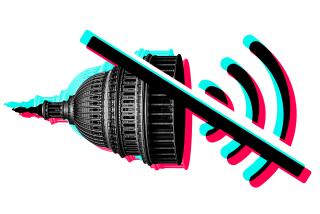Rage against iMachine
- Share via
You might think the music industry would be grateful to Apple Inc. for creating and promoting the iTunes Store, one of the bright spots in music retailing during a decade of plunging sales. In June, the store passed another milestone, notching its 5 billionth song sold, either individually or in albums. If it keeps up the current pace, it could top 7 billion early next year. And yet numerous executives at the major record companies chafe at Apple’s success, complaining that its dominance among online music stores has them hamstrung.
Apple dominates the market for portable music players too, thanks to its wildly popular iPods. These leadership positions reinforce one another: Many of the tracks sold by the iTunes Store come with electronic locks that only iPods can open, and iPods alone can work seamlessly with the iTunes software. Motivated in part by their desire to loosen Apple’s grip, the major labels agreed last year to sell songs without electronic locks -- an enormous concession both to consumers and to Apple’s competitors. Yet label executives still fume about Apple’s refusal to sell tracks for anything other than 99 cents, as well as its insistence that every track on an album be available as a single.
Last month, Warner Music Group decided to rage against the iMachine. It yanked a fast-selling downloadable single, “American Boy” by British hip-hop chanteuse Estelle, off iTunes, along with her latest LP, “Shine.” It pulled the single (but not the album) off the MP3 stores at Amazon.com, Wal-Mart, Napster and Rhapsody too. The label’s hope was that if Estelle’s fans couldn’t buy “American Boy” by itself, they would pony up the extra $5 to $7 for her album. But it had to test its hypothesis without the help of iTunes, the most popular music retailer, because Apple wouldn’t offer Estelle’s works on an album-only basis.
It’s easy to understand why labels would rather sell albums than singles. And they could use less draconian ways to boost album sales if Apple were more flexible, said Frank Luby, a pricing expert and Warner consultant. For example, they might raise the price of hit singles to $1.49 or $1.99, narrowing the gap between the cost of a couple of songs and an LP.
The problem with that approach, though, is that it ignores the reality of the music business today. Having bought too many shoddy releases by heavily promoted artists, many consumers are convinced that albums have only a couple of tracks worth keeping. So if they can’t find the specific tracks they covet at their favorite online store, they’re more likely to copy them from one of the innumerable free (but illegal) sources online than invest in a full album. That’s especially true when unfamiliar artists such as Estelle are involved. People can’t be forced to be customers these days. It has to be their choice.
More to Read
The biggest entertainment stories
Get our big stories about Hollywood, film, television, music, arts, culture and more right in your inbox as soon as they publish.
You may occasionally receive promotional content from the Los Angeles Times.










